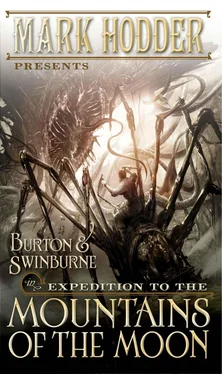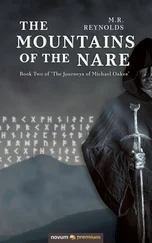Mark Hodder - Expedition to the Mountains of the Moon
Здесь есть возможность читать онлайн «Mark Hodder - Expedition to the Mountains of the Moon» весь текст электронной книги совершенно бесплатно (целиком полную версию без сокращений). В некоторых случаях можно слушать аудио, скачать через торрент в формате fb2 и присутствует краткое содержание. Жанр: sf_stimpank, на английском языке. Описание произведения, (предисловие) а так же отзывы посетителей доступны на портале библиотеки ЛибКат.
- Название:Expedition to the Mountains of the Moon
- Автор:
- Жанр:
- Год:неизвестен
- ISBN:нет данных
- Рейтинг книги:5 / 5. Голосов: 1
-
Избранное:Добавить в избранное
- Отзывы:
-
Ваша оценка:
- 100
- 1
- 2
- 3
- 4
- 5
Expedition to the Mountains of the Moon: краткое содержание, описание и аннотация
Предлагаем к чтению аннотацию, описание, краткое содержание или предисловие (зависит от того, что написал сам автор книги «Expedition to the Mountains of the Moon»). Если вы не нашли необходимую информацию о книге — напишите в комментариях, мы постараемся отыскать её.
Expedition to the Mountains of the Moon — читать онлайн бесплатно полную книгу (весь текст) целиком
Ниже представлен текст книги, разбитый по страницам. Система сохранения места последней прочитанной страницы, позволяет с удобством читать онлайн бесплатно книгу «Expedition to the Mountains of the Moon», без необходимости каждый раз заново искать на чём Вы остановились. Поставьте закладку, и сможете в любой момент перейти на страницу, на которой закончили чтение.
Интервал:
Закладка:
Those had been the words of Spring Heeled Jack, the man from the future. The “bitch” referred to was Isabel Arundell, and the speech had been a clue to the life he would have led had history not changed-perhaps the life he was meant to lead. In rejecting it, it now appeared that he'd inadvertently placed himself at the centre of a maelstrom that would shape the future of the world.
Why must it rest on my shoulders?
He watched the animals moving through the heat.
A horrible sense of inevitability settled over him.
The long slog continued.
Eventually, the desert became a featureless grassy plain, which disappeared into a tough, tightly packed jungle, and beyond it they reached the village of Ziwa, where they were received with war cries and a shower of poison-tipped arrows.
Five porters were killed and three mules went down before Said managed, through much shouting, to communicate the fact that the long line of men was not an invading army but a peaceful safari.
The headman argued that all muzungo mbaya came to kill and steal. “Go!” he hollered. “Turn around and go all the way back to your own lands and remain in them! This place is our home and if you try to cross it we shall kill you with our arrows and then we shall take our spears and use them to kill you a second time!”
One of the lead porters laid down the bundle of cloth he'd been carrying on his head and stepped forward. “Goha!” he cried. “Do you not recognise me? It is Kidogo, who was stolen from this village by slavers some days and days and days ago!”
The p'hazi moved his head left and right as he examined the man. “H'nn! Yes, you are the son of Maguru-Mafupi, who was the son of Kibuya, who had pain in his joints and was the son of a man whose name I cannot remember but he had big ears. So now you, who were taken from us, are the slave of these white devils?”
“No! It was the one named Tippu Tip who put me in chains, but these men came and set me free. They set all these others free, too. And now I have come home, and I see my mother!”
Before the p'hazi could react, a caterwauling arose from behind the gathered warriors and a woman shoved her way through them and ran to the porter, throwing herself upon him.
“It is Kidogo, my son!” she wailed, and gave forth a loud ululation, which was quickly taken up by all the women of the village.
Goha threw down his bow and jumped up and down on it in a fit of temper. He yelled at Kidogo: “See what noise you have caused by coming home after being stolen from us? Now the women will expect a feast and drumming and dancing and we will have to dress in our finest cottons! Is there no end to the troubles and inconveniences caused by the muzungo mbaya?”
Burton stepped forward and spoke in the man's language: “Perhaps, O p'hazi , if we provided the food?”
“And alcohol?”
“Yes. We have beer and gin and-”
Swinburne, who understood nothing except the words “beer” and “gin,” whispered urgently: “Don't give him the brandy!”
“-and gifts.”
“You will pay hongo?”
“We will pay.”
Goha scratched his stomach and looked at Burton with interest. He shouted: “Kidogo! Tell your mother to be quiet! I can't think with all her clucking and twittering!”
The liberated slave nodded and guided his parent into the village. The ululations quietened. The headman huddled into a group with his warriors and they murmured and argued and complained, with many a glance at the white men. After a few minutes, Goha turned back to Burton. He bent and picked up his bow.
“See,” he said. “You have been here but a little time and already you have broken my bow, which I have treasured my entire life, and which I made just yesterday. You people have skin like ghosts and cause destruction and misery and problems wherever you put your feet.”
“We shall replace your weapon.”
“Whatever you give me will not be as good. Is it true that you eat your dead and use their bones to make the roofs on your huts?”
“No, that is not true.”
“Is it true that Uzungu -the White Land-is far across the water and in it bright beads grow underground and the men have more wives even than I?”
“How many wives do you have?”
“Eight.”
“No, that, also, is not true, though my land is far across the water.”
“I meant five.”
“It is still not true.”
“And the beads?”
“They do not grow underground.”
“Is it true that the flowers and plants obey your will?”
“They will not obey my people but there are white men from a different land who possess some such control. They are my enemy. Have you seen them?”
“Yes. They came at night and took our cattle for meat and killed two of our women for no reason except that they like killing. They were angry because their porters kept running away and they tried to take the men of this village to replace them but we prevented that from happening, for we are fierce warriors.”
“How did you prevent it?”
“By running fast and hiding in the jungle. Sit and eat and sing and dance with us and I will tell you more of them after you have given me some beer and a better bow than this excellent one, which you broke.”
In this long-winded manner, Burton was invited to set up camp at the village, and while his friends and the porters enjoyed what turned out to be fine hospitality, Burton sat in conference with Goha and the other elders and learned that the whole region was aware that two expeditions were travelling toward the interior, and that one of them did not respect the customs of the people, while the other one did.
Of Speke's expedition, he was informed that it was perhaps three times the size of his own and comprised mainly of Prussians, with just a few African guides and maybe seventy porters. There were eight of the plant vehicles with it, and these, just as Burton's harvestman had done on the first day of the safari, caused great fear wherever they were seen.
Despite this, Speke's people were in complete disarray.
Confident that he could forge ahead by brute force alone, Burton's former travelling companion had opted not to carry specie and was refusing to pay hongo. As a result, his path through East Africa, which had thus far followed a route parallel to and some fifty miles north of Burton's own, had been made extremely hazardous by villagers, who'd run ahead to warn of his approach. Traps and obstructions had been set: the thorns of bushes to either side of the trail were smeared with poison; sharp spines were pushed point-upward into the mud of countless nullahs ; and arrows and spears were launched from the undergrowth.
As it struggled through this, Speke's column of men had become ever more ragged. His porters were not paid, like Burton's, but were slaves, and they took every opportunity to slip away, often carrying equipment with them. As for the Prussian soldiers, not being accompanied by a Sister of Noble Benevolence, they had succumbed again and again to fevers and infections.
Just as Burton had suspected, Speke's long head start had been eaten away, and, frustrated, the traitor had recently attempted to solve his problems by leaving the northern trail to join the southern one, which the king's agent was following. The question was: how far in front was he?
As usual, establishing a realistic sense of time was a hopeless endeavour. When asked how long ago Speke had passed, Burton received the reply: “Days and days and days and days and days and days.”
“How many?”
“This-” And Goha stretched out his arms to indicate a distance.
It was impossible to understand what he meant, and despite Burton's experience, and no matter how many different ways he asked the question, he didn't receive a comprehensible answer.
Читать дальшеИнтервал:
Закладка:
Похожие книги на «Expedition to the Mountains of the Moon»
Представляем Вашему вниманию похожие книги на «Expedition to the Mountains of the Moon» списком для выбора. Мы отобрали схожую по названию и смыслу литературу в надежде предоставить читателям больше вариантов отыскать новые, интересные, ещё непрочитанные произведения.
Обсуждение, отзывы о книге «Expedition to the Mountains of the Moon» и просто собственные мнения читателей. Оставьте ваши комментарии, напишите, что Вы думаете о произведении, его смысле или главных героях. Укажите что конкретно понравилось, а что нет, и почему Вы так считаете.












